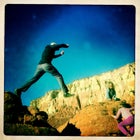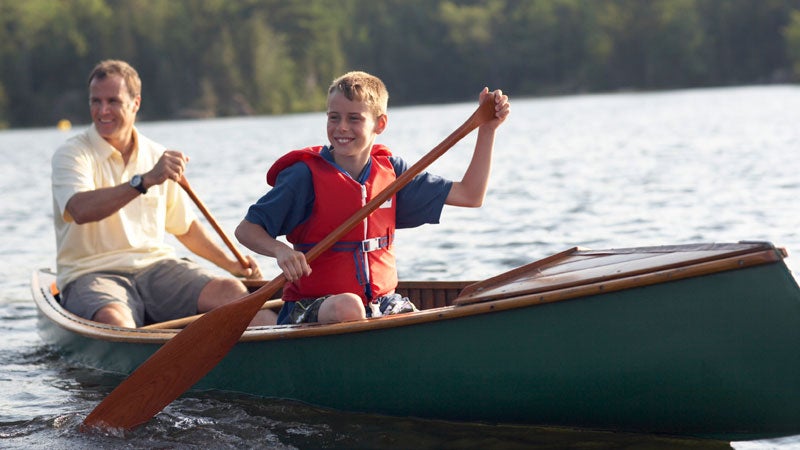For the past ten days, I have been on a solo expedition, a rigorous mission that demands both mental and physical stamina, getting up before first light, and carrying heavy loads.
Going solo demands being fully present, alert to your surroundings, and vigilant about your systems. It is a kind of meditation, then, a way to be fully awake in the world, alone with your thoughts and, eventually, free from them.
 Leap of faith: Soloing builds better parents
Leap of faith: Soloing builds better parentsI’ve been at home, taking care of the kids.
When two adventurers marry and produce offspring together, the opportunity for solos automatically doubles. Your partner’s going to want to leave town, or you will, and somebody has to mind the babies. It’s good to be positive about this. Just as solo adventuring makes us stronger athletes, solo parenting makes us better mothers and fathers.
Steve’s been going backcountry skiing in British Columbia almost every winter for the past five years. In the past, my strategy for solo parenting usually entailed avoiding it. I’d call in grandparent reinforcements or decamp with Pippa and Maisy to my mother’s in Connecticut. But now that our daughters are three and five and act less like little wild wolverines and more like semi-rational human beings, they’ve become easier to manage by myself. So this year, I decided, we’d stay put on home turf.
The key to soloing, I’ve learned, is to keep expectations low. When Steve’s away, I clear my schedule and simplify. This is not the time for planning dinner parties (not that I ever do) or redecorating the house (ditto) or booking non-essential doctor’s appointments or getting cavities filled or taking the recycling out or doing anything above and beyond daily survival. The only real goal is that everyone lives. You’d be surprised how easy it is to let go of trivial concerns when your partner is deep in the backcountry skiing unstable snowpack above tree line every day. When you’re worrying about avalanches sweeping away your true love and father of your children, you can become very Zen about daily life on the homefront.
Still, the minute Steve left, I knew I’d have to bring my A game. The last words he said to me at 6 a.m. before he left for the airport were, “Sorry to tell you this, but Pete had diarrhea all over his crate.”
As I lay there in the dark bedroom, my mind raced to make a plan. Ten long days of soloing stretched before me. I needed a strategy, but there were so many unknowns, it would be impossible to map them all out. Then I remembered a exercise I’d done in a Native American-inspired dawn ceremony at a resort in Sedona a few years ago. There, in a dimly-lit crystal grotto, we silently declared our intentions for the day, giving thanks in advance that they would come true. It had felt contrived and New Agey to me at the time, but it had worked that day and maybe it would again. “Please let us have a nice, calm family day,” I vowed to myself. “And let me accept help if it’s offered.” Then I got up to face the day, and the week.
���ϳԹ��� in the first rays of morning, I cleaned the poop and one very filthy, remorseful puppy while Pippa coached me through the window. It wasn’t as bad as I’d expected. When you have no choice but to hose down the dog before dawn and no partner to pawn it off on, you hose down the dog before dawn. That’s the beauty of soloing: It requires you to do what is in front of you when it is front of you. There’s no time for idle internet surfing or various other forms of goofing off when dinner needs to be made. You have ravenous children about to go out of their minds if they’re not fed, so boiling noodles is your exact, only option. Vigilance like this is kind of liberating.
Thus was born my two-part strategy for the week. Before I got out of bed each morning, I tried to remember to set my intentions for the day—let me get my writing done with ease and efficiency; let me be more patient with the girls; let me not try to cram too much in. Once I was clear on how I hoped the day would go, then I could focus on running a tight ship. I got them to school on time, wrote while they were away, made dinner and fed them early, before they went crazy, and put them to bed by 7:30. I did the dishes while they were in the bath, made their lunches for the next day after they were asleep, and fed the dog before going to bed. Hyper organization, never my strong suit, became my system, my religion.
Meanwhile, Steve was crushing it in his own way. He and a group of friends and friends-of-friends had helicoptered into the Hilda Hut, a luxe, privately-run wilderness cabin at 6,300 feet in the Valhalla Range in the Selkirk Mountains, where they were skinning and skiing fresh lines all day everyday for a week. With an abundance of fresh snow following a warm spell, the snow pack was sketchy, like almost everywhere in the northern Rockies. “You can find the weak layer down there if you look for it,” Steve emailed me the day they arrived. “Don’t find it,” I responded.
When it comes to outdoor adventures, I can worry about almost anything. I’m particularly skilled at conjuring up images of horrific avalanches ripping off the tops of entire mountains, a season’s worth of snow burying everything and everyone in sight. But once I began to focus on what was in front of me, a funny thing happened. I stopped worrying so much about Steve. As the days went on, I no longer obsessively checked the clock every afternoon, wondering if he was back safely at the hut. Part of this was simple logistics. Because the Hilda Hut has wireless internet, unlike others run by the Canadian Alpine Club where they’d stayed in years past, I could follow his progress on Facebook. I knew he’d survived another day when I saw his friends’ photos pop up on my newsfeed. But part of this was practice, too. The more present I became to mothering my girls alone, the less gripped by worst-case scenarios I became.
Since we first met, Steve and I have always gone off on our own trips. We share a love for rivers, trails, mountains, and snow, but sometimes our priorities diverge, and we’ve learned to give each other time and space to do what we love. This is healthy. I want to mountain bike the White Rim trail. He flies to Hawaii to play in an Ultimate tournament. I spend a week whitewater kayaking in northern California and riding in the Sawtooths. He goes climbing in Red Rocks. Divide and conquer. It makes homecoming, and the adventures we plan together—trekking Nepal, skiing in Austria, and paddling rivers, and climbing peaks throughout the Southwest—even sweeter.
But once we had kids, I had to re-learn how to be gracious about Steve’s leaving. Even though I get to go on my own adventures nearly as often, I’ve been known to grouse before he leaves and guilt him for going after he gets back. That’s like hitting the delete button and wiping out all the fun he had in one fell swoop. Totally pointless. If he’s going to go, he might as well have the best possible time ever, and come home happy and recharged and stay that way for as long as possible. Everyone wins.
While Steve was skiing freshies and hot-tubbing and sauna-ing high in the Selkirks, back at home one of us after another fell victim to the stomach bug. First Pete. Then Pippa, who woke moaning once, twice, three times a night. Then me. We were sleep deprived and sick, but we still managed to carry on with our usual weekly roster of work and fun school, skiing, playing, writing. What choice did we have? Single parents know this intuitively, but even under less than ideal circumstances, soloing isn’t so hard if you get organized, come up with a system, and try your best to stick with it.
By the time the helicopter flew into the Hilda Hut to retrieve Steve and his friends, I’d barely eaten in four days. I’d forgotten to fill the bird feeders and take out the trash, but the pets were fed and the girls were alive, and even in my depleted state, I was full of something else: pride in myself, and the girls, all of us, for keeping it together. We’d done more than that. Rather than rush through my days in the usual blur, I’d felt myself sink in and slow down—a rare gift. I was more exhausted than I’d been the morning Steve left, but calmer, too.
You’d think that coming back together would be easier than saying goodbye, but this isn’t always the case with soloing. One person has been out in the wild, the other deep in the routine of home, and it always takes Steve and me a day or two to readjust to life as a team again. We share the details, but it’s almost impossible to get or give the full download; regular life sweeps over us, and the best we can do is replay the highlight reel and carry on.
Maybe it’s better this way. You experience something singular that sticks with you, and changes you for good, in different ways each time. This is why it’s so important to go, and to stay behind. You feel empathy for the other, and a hunger to go. Either way, it’s your turn next.


